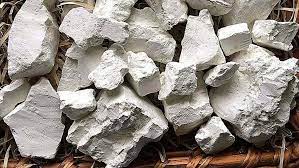
Kaolin, a remarkable mineral with a rich history, has played an essential role in various industries for centuries. Known for its diverse applications, kaolin has found its way into ceramics, paper, cosmetics, pharmaceuticals, and more.
Kaolin, derived from the Chinese word "Gaoling" meaning "high ridge," was first discovered in the hills of Kiangsi, China. It is a fine white clay mineral primarily composed of the mineral kaolinite, formed through the weathering of rocks rich in aluminum silicates. The geological processes involved in its formation contribute to the unique properties that make kaolin so valuable.
Kaolin exhibits distinctive properties that set it apart from other minerals. It is known for its high plasticity, non-abrasive nature, and fine particle size, which lend versatility to its applications. Kaolin varies in quality and properties based on factors such as the geological source, purity, and processing techniques. The two main types of kaolin are known as soft kaolin and hard kaolin, each offering different characteristics suitable for specific applications.
Nigeria, endowed with rich mineral resources, boasts substantial deposits of kaolin in several locations. This article aims to shed light on the location of kaolin deposits in Nigeria and explore the diverse range of uses for this mineral, contributing to the nation's economy and industrial development.
Kaolin, also known as china clay, is a soft white clay mineral composed mainly of kaolinite. It is formed through the weathering of aluminum silicate minerals, such as feldspar and granite. Its unique physical and chemical properties make it a valuable raw material in multiple industries.
Location of Kaolin Deposits in Nigeria
Nigeria is blessed with abundant kaolin deposits spread across different regions of the country. Here are some notable locations:
Kankara-Kabbi Area, Sokoto State: Located in the Northwestern region of Nigeria, Sokoto State harbors vast reserves of kaolin. The Kankara-Kabbi area, specifically, is renowned for its high-quality kaolin deposits, attracting local and international investors.
Ijero-Ekiti, Ekiti State: In the Southwest region, Ekiti State is home to significant kaolin deposits, particularly in the Ijero-Ekiti area. The region boasts both large-scale mining operations and numerous small-scale mining activities.
Nsu-Isuikwuato, Abia State: Situated in the Southeastern part of Nigeria, Abia State is recognized for its kaolin-rich Nsu-Isuikwuato area. The deposits in this region have proven potential for commercial exploitation.
Idoma, Benue State: Benue State, located in the North-Central region, hosts substantial reserves of kaolin in the Idoma community. These deposits contribute significantly to the local economy and industrial activities.
Jakura, Kogi State: Kogi State, situated in the central region of Nigeria, possesses kaolin deposits in the Jakura locality. The region's kaolin reserves are highly sought after for their quality and purity.
Extraction and Processing
The extraction of kaolin involves a multi-step process that begins with exploration and mining. Traditional mining methods involve the removal of overburden and excavation of the kaolin-rich deposits. Once extracted, the raw kaolin undergoes various processing techniques such as dispersion, purification, drying, and particle size reduction. These processes ensure the removal of impurities, enhancing the quality and performance of kaolin for different applications.
Uses of Kaolin
The versatile nature of kaolin lends itself to a wide range of applications in various industries. Here are some key areas where kaolin finds extensive utilization:
Ceramics and Pottery: Kaolin's unique plasticity and high heat resistance make it an indispensable ingredient in the production of ceramics, pottery, and porcelain. It enhances the strength, whiteness, and smoothness of the final products.
Paper and Pulp Industry: Kaolin serves as a crucial component in the paper and pulp industry. Its fine particle size and ability to form a protective coating on paper fibers enhance the paper's brightness, opacity, and printability.
Paints and Coatings: The paint industry extensively employs kaolin as a filler and pigment extender. Its fine particle size contributes to improved paint formulation, providing better coverage, durability, and color stability.
Rubber and Plastics: In the rubber and plastics sector, kaolin acts as a reinforcing filler, enhancing the mechanical properties of the final products. It improves dimensional stability, tensile strength, and resistance to wear and tear.
Pharmaceuticals and Cosmetics: Kaolin finds applications in pharmaceutical formulations, serving as an excipient in tablets and capsules due to its inert nature. It is also utilized in the cosmetics industry for its absorbent and oil-absorbing properties in products such as face masks, powders, and lotions.
Construction and Ceramics: In the construction industry, kaolin is utilized in the production of cement, bricks, tiles, and ceramics. It acts as a binding agent, improving the strength and workability of construction materials.
Agrochemicals: Kaolin-based formulations are employed in agrochemicals for their pest control and crop protection properties. It forms a protective film on plant surfaces, preventing pests and reducing disease incidence.
Refractories and Insulation: Kaolin's high melting point and thermal stability make it an essential component in the production of refractory materials and insulation products. It is used in the manufacture of crucibles, kiln furniture, and fire bricks.
Environmental Impact and Sustainability
The mining and processing of kaolin can have environmental implications, including land disturbance and water pollution. However, modern techniques and responsible practices are being adopted to mitigate these impacts.
Additionally, kaolin's natural abundance, renewability, and biodegradability contribute to its sustainability and minimize its overall environmental footprint.
In conclusion, Nigeria's abundant kaolin deposits across various regions offer tremendous potential for economic growth and industrial development. The strategic utilization of this versatile mineral in industries such as ceramics, paper, paints, rubber, pharmaceuticals, and construction is crucial for the nation's progress.
By harnessing the wealth of its kaolin resources, Nigeria can attract investments, generate employment opportunities, and contribute to the diversification of its economy.






















